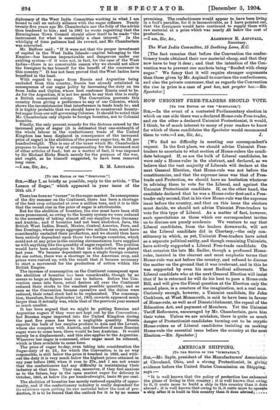There has been no "corner" in the sugar market. In
consequence of the dry summer on the Continent, there has been a shortage of the beet crop estimated at over a million tons, and it is to this that the recent rise in the price of sugar is attributable.
But for the abolition of bounties, the rise must have been still more pronounced, as owing to the bounty system we were reduced to the necessity of taking almost all our supplies from Germany and Austria ; and if bounties had not been abolished, Java, the British West Indies, Brazil, Mexico, Central America, Peru, and San Domingo, whose crops aggregate two million tons, must have considerably curtailed their production, and we should then have been entirely dependent upon these two foreign countries, which could not at any price in the existing circumstances have supplied us with anything like the quantity of sugar required. The position would have been analogous to that in which cotton was placed last year. We became dependent upon a single foreign country for our cotton, there was a shortage in the American crop, and prices were rushed up, with the result that it became necessary to start a movement for the production of cotton within the British Empire.
The increase of consumption on the Continent consequent upon the abolition of bounties has been considerable, though by no means so large as figures lead one to believe. Before the Con- vention came into force, retail dealers all over the Continent reduced their stocks to the smallest possible quantity, and as soon as the Convention became operative and the duties were reduced, their retail stock had to be replenished. The consump- tion, therefore, from September 1st, 1903, onwards appeared much larger than it actually was, while that of the previous year seemed so much smaller.
It has been argued that we might be getting Russian and Argentine sugars if they were not kept out by the Convention ; but Russian sugar imported into the United Kingdom during the past five years has been a negligible quantity. Russia exports the bulk of her surplus produce to Asia and the Levant, where she competes with Austria, and therefore if more Russian sugar were to come here, there would be less Austrian. It would merely be a displacement ; and this also applies to the Argentine. Wherever her sugar is consumed, other sugar must be released, which is then available to come here.
The price of sugar to-day, even taking into consideration the Sugar-duty of 4s. 2d., for which the Convention is in no way responsible, is still below the price it touched in 1893, and with- out the duty it is very much below the highest prices attained in any year before 1889, when it rose to 27s., and I am not aware that the confectioners had any difficulty in maintaining their industry at that time. They can, moreover, if they feel anxious as to the future, buy in the open market sugar for delivery in October, 1905, at below 11s. per hundredweight, basis 88 per cent.
The abolition of bounties has merely restored equality of oppor- tunity, and if the confectionery industry is really dependent for its existence upon getting its raw material below the cost of pro- duction, it is to be feared that the outlook for it is by no means
promising. The confectioners would appear to have been living in a fool's paradise, for it is inconceivable, as I have pointed out, that the foreigners would have continued to supply them with raw material at a price which was nearly .4 below the cost of production.
—I am, Sir, &c., ALGERNON E. ASPINALL,
Secretary.
[The fact remains that before the Convention the confec- tionery trade obtained their raw material cheap, and that they now have to buy it dear ; and that the intention of the Con- vention was to prevent our markets being "flooded with cheap sugar." We fancy that it will require stronger arguments than those given by Mr..Aspinsil to convince the confectioners, and also the private consumer, that as regards the Convention the rise in price is a case of post hoc, not propter hoc.—ED. Spectator.]






































































 Previous page
Previous page